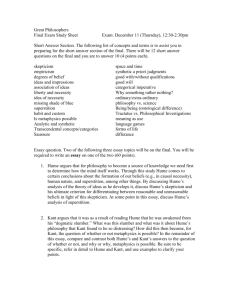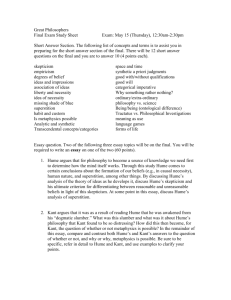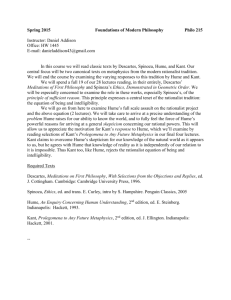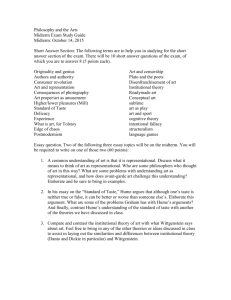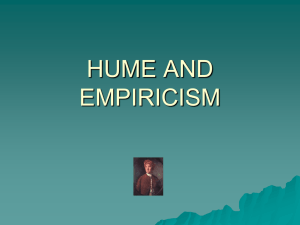Lectureone
advertisement
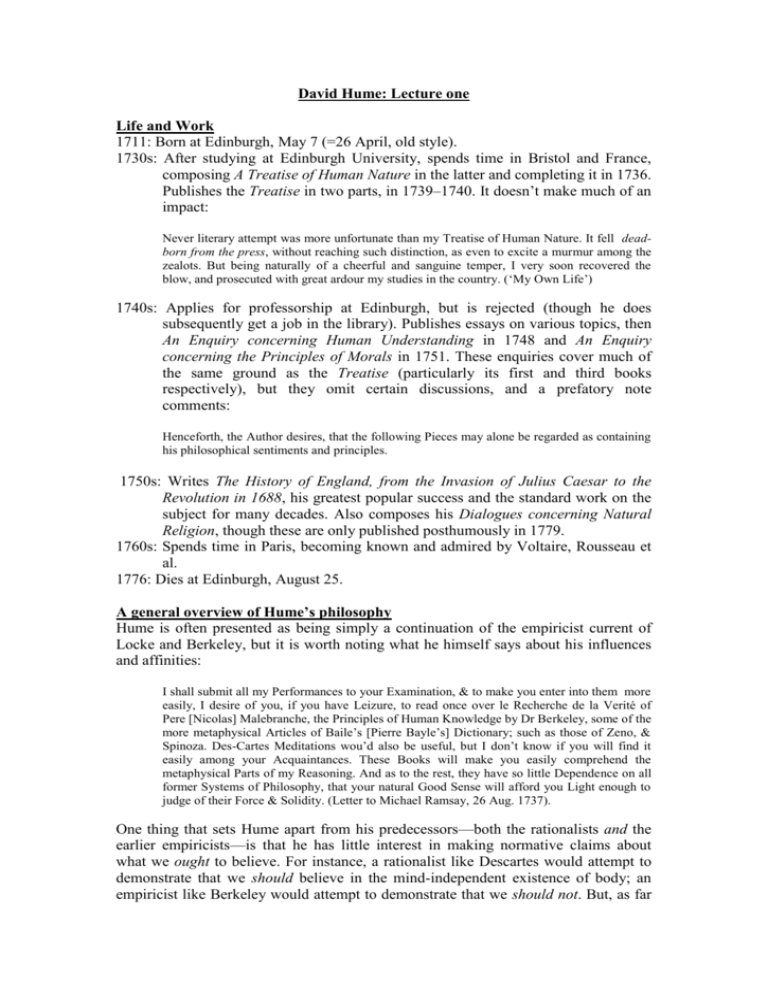
David Hume: Lecture one Life and Work 1711: Born at Edinburgh, May 7 (=26 April, old style). 1730s: After studying at Edinburgh University, spends time in Bristol and France, composing A Treatise of Human Nature in the latter and completing it in 1736. Publishes the Treatise in two parts, in 1739–1740. It doesn’t make much of an impact: Never literary attempt was more unfortunate than my Treatise of Human Nature. It fell deadborn from the press, without reaching such distinction, as even to excite a murmur among the zealots. But being naturally of a cheerful and sanguine temper, I very soon recovered the blow, and prosecuted with great ardour my studies in the country. (‘My Own Life’) 1740s: Applies for professorship at Edinburgh, but is rejected (though he does subsequently get a job in the library). Publishes essays on various topics, then An Enquiry concerning Human Understanding in 1748 and An Enquiry concerning the Principles of Morals in 1751. These enquiries cover much of the same ground as the Treatise (particularly its first and third books respectively), but they omit certain discussions, and a prefatory note comments: Henceforth, the Author desires, that the following Pieces may alone be regarded as containing his philosophical sentiments and principles. 1750s: Writes The History of England, from the Invasion of Julius Caesar to the Revolution in 1688, his greatest popular success and the standard work on the subject for many decades. Also composes his Dialogues concerning Natural Religion, though these are only published posthumously in 1779. 1760s: Spends time in Paris, becoming known and admired by Voltaire, Rousseau et al. 1776: Dies at Edinburgh, August 25. A general overview of Hume’s philosophy Hume is often presented as being simply a continuation of the empiricist current of Locke and Berkeley, but it is worth noting what he himself says about his influences and affinities: I shall submit all my Performances to your Examination, & to make you enter into them more easily, I desire of you, if you have Leizure, to read once over le Recherche de la Verité of Pere [Nicolas] Malebranche, the Principles of Human Knowledge by Dr Berkeley, some of the more metaphysical Articles of Baile’s [Pierre Bayle’s] Dictionary; such as those of Zeno, & Spinoza. Des-Cartes Meditations wou’d also be useful, but I don’t know if you will find it easily among your Acquaintances. These Books will make you easily comprehend the metaphysical Parts of my Reasoning. And as to the rest, they have so little Dependence on all former Systems of Philosophy, that your natural Good Sense will afford you Light enough to judge of their Force & Solidity. (Letter to Michael Ramsay, 26 Aug. 1737). One thing that sets Hume apart from his predecessors—both the rationalists and the earlier empiricists—is that he has little interest in making normative claims about what we ought to believe. For instance, a rationalist like Descartes would attempt to demonstrate that we should believe in the mind-independent existence of body; an empiricist like Berkeley would attempt to demonstrate that we should not. But, as far as Hume is concerned, that question is irrelevant: the fact is that we do believe this, and that’s all that really counts. Hume’s approach to metaphysics and epistemology might be compared to the approach he takes to ethics. Of the latter, he writes: In every system of morality, which I have hitherto met with, I have always remark’d, that the author proceeds for some time in the ordinary way of reasoning, and establishes the being of a God, or makes observations concerning human affairs; when of a sudden I am surpriz’d to find, that instead of the usual copulations of propositions, is, and is not, I meet with no proposition that is not connected with an ought, or an ought not. This change is imperceptible; but is, however, of the last consequence. For as this ought, or ought not, expresses some new relation or affirmation, ’tis necessary that it shou’d be observ’d and explain’d; and at the same time that a reason should be given, for what seems altogether inconceivable, how this new relation can be a deduction from others, which are entirely different from it. (Treatise, book 3, part 1, section 1). In Hume’s opinion, there is no valid deduction from the way things are to any conclusion about how things ought to be. Consequently, Hume’s ethical works are purely descriptive, analysing empirically how our moral sentiments arise within us, but never presuming to judge whether these are, in any absolute sense, the right sentiments for us to have. Likewise in epistemology, he traces the origins of certain classes of universally-held beliefs, but he does not offer a judgment about whether we are, in any absolute sense, correct in holding such views. We can’t help but hold them anyway, so the question of correctness or incorrectness is just as redundant as it is unanswerable. Hume subtitled the Treatise, ‘An Attempt to introduce the experimental Method of Reasoning into Moral Subjects’. He was very enthusiastic about the new science, and Newtonianism in particular, and he wanted to establish an analogous ‘Science of Man’. ’Tis evident, that all the sciences have a relation, greater or less, to human nature; and that however wide any of them may seem to run from it, they still return back by one passage or another. Even Mathematics, Natural Philosophy, and Natural Religion, are in some measure dependent on the science of MAN; since they lie under the cognizance of men, and are judged of by their powers and faculties. (Treatise, Introduction). In somewhat the same way as Newton had laid out the laws whereby gravity operated, while at the same time stubbornly refusing to answer the question of what it was that was operating in this way—on the grounds that the experimental evidence was silent on that issue—Hume wants to describe the structure of human cognition, but to go no further than that. In general terms, he feels that there are two main elements that, between them, work to generate our natural beliefs and judgments. Experience is certainly one of these, and an essential one too—hence the standard classification of Hume as an empiricist—but there is also another. Most of our beliefs about the world, for Hume, are not simply derived from our experience thereof. But then, on the other hand, they do not result from our intellectual faculties either, even in conjunction with that experience. Rather, they result out of the way the passionate side of human nature is disposed to respond to experience. Hume regards human beings as fundamentally governed by instincts and habits, little different from animals. the experimental reasoning itself, which we possess in common with beasts, and on which the whole conduct of life depends, is nothing but a species of instinct or mechanical power, that acts in us unknown to ourselves; and in its chief operations, is not directed by any such relations or comparisons of ideas, as are the proper objects of our intellectual faculties. Though the instinct be different, yet still it is an instinct, which teaches a man to avoid the fire; as much as that, which teaches a bird, with such exactness, the art of incubation, and the whole economy and order of its nursery. (Enquiry, sect. 9). The beliefs that we form will indeed extend beyond what the raw data of experience themselves reveal: but we have no rational justification for extending our judgments in this way, a justification of the kind that might indicate that we are right thus to extend them. It is just a matter of fact that such a passionate impulse does exist within us, common to all people and constitutive of human nature as such. On the other hand, reason will not suggest that there is anything wrong with our thus extending our judgments either: it is simply silent on the issue. Hume feels that it is a mistake to suppose that pure reason can ever discover any matters of fact at all, whether positive or negative. Rather, Reason is, and ought only to be the slave of the passions, and can never pretend to any other office than to serve and obey them. (Treatise, bk. 2, pt. 3, sect. 3). Although Hume does present plenty of rational arguments in the course of his discussion, their goal is simply to show the impotence of reason itself, when dealing with concrete matters of fact (as opposed to purely abstract ‘relations of ideas’, such as mathematical principles). Any attempt to live according to the dictates of pure reason will be self-defeating, for rational argument, if pushed to its ultimate conclusion, can yield only a thoroughly impractical scepticism. Ultimately, Hume is pretty down on philosophy as it had traditionally been practiced. He does like mathematics, which is rational but which tells us nothing about the real world. He also likes natural science, which does tell us about the world but which is neither rational nor irrational—it is simply a more careful and regimented version of what our nonrational passions and impulses drive us all to do anyway. But that is all that he has any real sympathy for: When we run over libraries, persuaded of these principles, what havoc must we make? If we take in our hand any volume; of divinity or school metaphysics, for instance; let us ask, Does it contain any abstract reasoning concerning quantity or number? No. Does it contain any experimental reasoning concerning matter of fact and existence? No. Commit it then to the flames: for it can contain nothing but sophistry and illusion. (Closing words of the Enquiry). Impressions and Ideas (Enquiry, sect. 2; Treatise, bk. 1, pt. 1, sect. 1) Hume subdivides perceptions into two categories: ‘impressions’ and ‘ideas’. Roughly speaking, impressions are the vivid perceptions that we receive in actual occurrent experience, such as when an external body acts upon our sense-organs, while ideas are the fainter copies of these that we subsequently form for ourselves in the imagination or dredge up from the memory. But Hume doesn’t want to presuppose anything about the origins of these perceptions, so instead he defines the distinction simply in terms of what they carry with them on the surface, namely their respective degrees of force and vivacity. Any forceful, lively, vivid, clear perception thereby qualifies as an ‘impression’; any fainter, weaker perception qualifies as an ‘idea’. Hume’s fundamental epistemological principle is that no idea can possess any content beyond what has already been received in prior impressions. This is supposed to be an empirical claim, rather than a conceptual one. There is certainly no logical reason why a faint idea shouldn’t just spontaneously appear in the mind, despite failing to resemble any earlier vivid impressions. But Hume believes that, just as a matter of fact about how human psychology develops over time, we simply do not encounter cases like that. Hume addresses the ‘innate ideas’ debate, which some might regard as central to the ‘empiricist’/‘rationalist’ division, but he regards that whole debate as being, frankly, just a bit of verbal trifling. In one corner, we have Locke, who claims that ideas do not precede experience. But then, in the other corner, there is Leibniz, who also claims that (actual) ideas do not precede experience (even though those ideas might nevertheless exist in a state of latent potentiality before they are eked out into conscious actuality by experiential stimuli). As far as Hume is concerned, the thing that both Leibniz and Locke can happily agree on is with that all ideas (defined in his way, as weaker perceptions) are posterior to corresponding impressions (defined simply as stronger ones). Hume does, however, identify an apparent counter-example to his own thesis. Imagine someone who has experienced every shade of blue, from the lightest to the darkest, apart from just one specific shade in the middle of the spectrum. Won’t he be able to use his imagination to fill in the gap, and figure out for himself what that missing shade of blue would look like? Hume acknowledges that he probably could do this. But this presents a problem for the general principle, because this person has neither had an impression of that particular shade, nor could he apparently form an idea of it by mentally dissecting the impressions of those other shades that he has experienced, and recombining their elementary parts in new ways (because impressions of colours would seem to be simple, without any component parts). However, Hume doesn’t let this apparent counter-example trouble him too much: ‘this instance is so singular, that it is scarcely worth our observing, and does not merit that for it alone we should alter our general maxim.’ Association of Ideas Having thus classified the contents of our minds, Hume then proceeds to describe how such perceptions can be related to one another. In the Treatise (bk. 1, pt. 1, sect. 5), he enumerates seven kinds of relation between ideas: resemblance, identity, spatiotemporal relations (distance, contiguity, etc.), relations of quantity, relations of quality, contrariety, and causal connections. But, at least as far as substantive facts about the world are concerned, he feels that these can be reduced to just three main heads: resemblance, contiguity, and causality. An idea or impression of one thing might stir up an idea of something else that resembles the first thing in some salient way (‘A picture naturally leads our thoughts to the original’). A perception of something might prompt the mind to think of something else in the same place as it (‘the mention of one apartment in a building naturally introduces an enquiry or discourse concerning the others’). Or, again, a perception of something might lead the mind to turn to the customary cause or effect of things of that sort (‘and if we think of a wound, we can scarcely forbear reflecting on the pain which follows it’—Enquiry, sect. 3). Hume compared the centrality of these three associations of ideas, in any adequate account of human cognition, to the centrality of the gravitational force in any adequate account of physics. ‘Here is a kind of attraction, which in the mental world will be found to have as extraordinary effects as in the natural, and to shew itself in as many and as various forms.’ (Treatise, bk. 1, pt. 1, sect. 4). As we will see in detail as we go on, Hume felt that these associations played absolutely central roles in the establishment of various concepts that had been regarded as defining the traditional subject-matter of metaphysics: mind, body, causation, etc. And Hume did not reject these topics out of hand, but what he did feel was that the traditional philosophical approach to them had been misguided. Our rational powers, he felt, simply were not capable of giving us epistemological access to any kind of absolute truth on such matters, as traditional metaphysicians had hoped that they might be. Instead, the proper approach to topics like these, the only approach that had a chance of yielding any solid results, would be to examine how we came to develop such ideas in the first place—and Hume’s answer would be drawn up in terms of these three associations.

